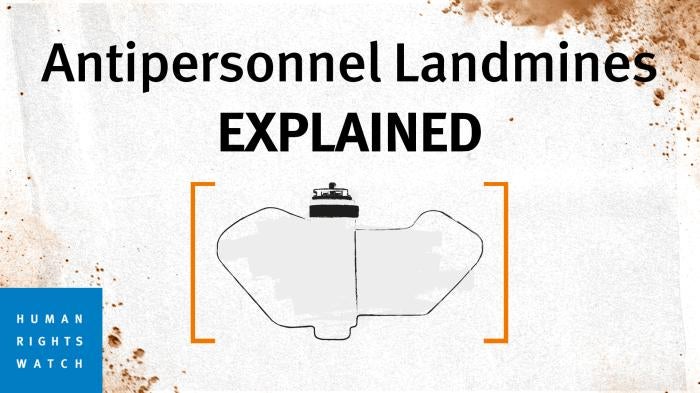(Geneva, April 14, 2025) – The United Nations Human Rights Council’s first resolution on landmines strongly endorses the long-standing international treaty prohibiting antipersonnel mines at a critical time, Human Rights Watch said today. The council Resolution 58/22 on “the impact of anti-personnel mines on the full enjoyment of all human rights” was adopted without a vote on April 4, 2025, the International Day for Mine Action and Mine Awareness.
Since March, five European countries have announced their intention to withdraw from the 1997 Mine Ban Treaty, while US government aid cuts have disrupted mine clearance operations around the world, putting civilian lives at risk.
“The UN Human Rights Council resolution on antipersonnel landmines, supported by countries from around the world, sends a clear message that these weapons violate fundamental human rights,” said Mary Wareham, deputy crisis, conflict and arms director at Human Rights Watch. “Countries contemplating leaving the Mine Ban Treaty should reconsider given the devastating, long-term risk posed to civilians and the global support for the ban.”
The resolution directs the UN high commissioner for human rights to report on the impact of antipersonnel mines “on the enjoyment of all human rights, with particular emphasis on economic, social and cultural rights.” It sets up an interactive dialogue on landmines at the council’s 62nd session in the first half of 2026.
Antipersonnel mines are designed to explode in response to a person’s presence, proximity, or contact. They are typically placed by hand, but can also be scattered by aircraft, rockets, and artillery or dispersed from drones and specialized vehicles. They cannot distinguish between soldiers and civilians, making them unlawfully indiscriminate under international humanitarian law.
Uncleared landmines pose a danger until cleared and destroyed. Mined land can drive displacement of the civilian population, hinder the delivery of humanitarian aid, and prevent agricultural activities. A Human Rights Watch report published on April 8, 2025, says that contamination from landmines, cluster munitions, and other weapons used during the 14-year conflict in Syria has killed at least 249 people, including 60 children, and injured another 379 since December 8, 2024.
The Landmine Monitor in its 2024 report found that civilians made up 84 percent of all recorded landmine casualties in 2023, while children were 37 percent of casualties when the age was recorded. The highest number of casualties in 2023 was recorded in Myanmar, where antipersonnel mines have been used by junta forces and opposition, and ethnic armed groups in all 14 Myanmar states and regions, affecting about 60 percent of the country’s townships.
A group of countries from all regions, including Algeria, Croatia, Mozambique, Peru, South Africa, United Kingdom, and Vanuatu, submitted the resolution to the council. The resolution notes the positive efforts of countries, international organizations, and civil society to address the humanitarian impacts of antipersonnel mines through implementation of the Mine Ban Treaty, also called the Ottawa Convention. It urges all countries to accede to the treaty and “strengthen their efforts to put an end to the suffering and casualties caused by antipersonnel mines.”
The Mine Ban Treaty, ratified by 165 countries, prohibits use, production, transfer, and stockpiling of antipersonnel mines and requires parties to destroy stockpiles, clear mined areas, and assist victims. Russia has not joined the treaty and its forces have used antipersonnel landmines extensively in Ukraine since its full-scale invasion in 2022, causing civilian casualties and contaminating agricultural land. Mine Ban Treaty member state Ukraine has also used antipersonnel mines since 2022 and has received them from the United States, in violation of the treaty.
Russia’s war in Ukraine and uncertainty over Europe’s future security are contributing to a difficult environment as five European Union member states are considering leaving the treaty. On March 18, defense ministers from Poland, Estonia, Latvia, and Lithuania announced their governments’ intent to withdraw from the treaty. On April 1, Prime Minister Petteri Orpo of Finland announced that his government is preparing to withdraw from the treaty to “give us the possibility to prepare for the changes in the security environment in a more versatile way.”
Withdrawal from the Mine Ban Treaty typically requires formal parliamentary approval by the state party concerned. Article 20 of the treaty explicitly prevents a state party that is engaged in armed conflict from withdrawing before the end of the conflict. Any withdrawal will take effect six months after the denunciation documents are submitted to the UN and the convention’s states parties as long as the country is not engaged in armed conflict at that time.
For over three decades, the United States has been the world’s largest contributor to humanitarian demining, mine risk education, and rehabilitation programs for landmine survivors. But the Trump administration’s deep cuts to foreign aid are now disrupting mine clearance operations. Thousands of deminers have been fired or put on administrative leave pending the completion of ostensible reviews.
Of the 47 current members of the council, 40 have ratified the Mine Ban Treaty. China, Cuba, Georgia, Kyrgyzstan, Morocco, South Korea, and Vietnam have not.
The council resolution says that all states and other relevant stakeholders should cooperate to accelerate demining efforts and ensure inclusive, non-discriminatory, and comprehensive victim assistance. It also urges “coordinated, multi-sectoral efforts” so that the needs of landmine survivors—in particular children, their families and communities—are effectively addressed and “their human rights promoted and protected.”
“Statements by European countries looking to withdraw from the Mine Ban Treaty ignore the reasons they joined the treaty in the first place,” Wareham said. “They should remind themselves why antipersonnel mines have been thoroughly stigmatized for decades and not seek a return of this ghastly weapon.”
Human Rights Watch is a co-founder of the International Campaign to Ban Landmines, which received the 1997 Nobel Peace Prize, and the Cluster Munition Coalition. It contributes to the campaign’s annual Landmine and Cluster Munition Monitor reports.




